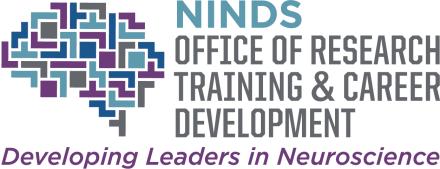The NINDS Office of Research Training and Career Development (RTCD) is committed to enriching the training and mentoring experiences of all intramural scientists while promoting diversity in the neuroscience workforce. We offer a variety of services and activities to all trainees who are actively involved in basic science and clinical research.
Our office team serves as a key resource for professional development opportunities, to prepare our fellows and students to achieve their career goals. We also support the mentoring needs of our staff scientists, staff clinicians, and tenure-track investigators.
On this page, you’ll find our current services and activities. Plus, browse the menu at the left for upcoming events and information about an NINDS-specific funding opportunity for postdoctoral fellows. We are here to support you!
Learn more about us at Research Training and Career Development Staff.
Office Services
One-on-one career advising
Our counseling sessions support you through individualized guidance on various topics that advance your education and career, such as:
- Medical and graduate school applications
- Job searches
- Interview preparation
- Resumes
- Your network
- Grant application preparation
- Conflict resolution
- And more!
Grant application support
To help you develop your skills in grantsmanship, our office provides training sessions on writing winning grants and understanding the grant review process. We also provide a list of funding opportunities for both federal and non-federal grants.
Course and conference sponsorship
We sponsor participation in relevant courses and conferences to enhance your scientific knowledge, understanding of novel techniques for neuroscience research, and areas of your professional development.
Mentorship guidance
Our office disseminates mentoring resources that encourage conversations about research training, career planning, and academic progression—including recommendations for training expectations and career development strategies.
Diversity and outreach initiatives
With various programs, we promote diversity and inclusion at all training levels, focusing on both recruitment and retention of individuals, including those from underrepresented groups in the sciences.
We also create and participate in science outreach programs for K-12 students. These activities give students an opportunity to learn about neuroscience and STEM-M careers. Plus, NINDS intramural scientists can engage with the local community through science fairs, small science experiments and lab tours, workshops, mentoring, and research talks.
Office Activities
Career development workshops
We offer workshops on relevant topics, such as:
- Public speaking for scientists
- Job interviewing
- Leadership
- Lab management
- College teaching
- Writing for professional school and job applications
Exploration sessions for non-academic careers
These sessions give you an opportunity to explore various career options for scientists, including:
- Industry
- Teaching
- Technology transfer
- Consulting
- Science policy
- Grants management
- And other paths available
You will also learn about the professional skills you need to be successful in each career field.
Preparation for academic careers
We have programs and resources to help you prepare and apply for academic faculty positions, and we offer informational sessions where you can learn about all professorship job options.
Orientation Sessions
Our orientation sessions highlight NINDS and NIH-wide intramural resources that complement the mentoring experience you receive in the laboratory.
Responsible Conduct of Research Training
All NINDS fellows participate in the mandatory OITE and NINDS-sponsored Responsible Conduct of Research Training. This research ethics training will teach you about:
- Scientific integrity
- Reproducibility of data
- Authorship
- The mentor-mentee relationship
- Record keeping
- Data management
Professional skills building series
In this series, we target our mini-scientific lectures in neuroscience to your level of training while introducing advanced scientific concepts. In addition, through small working groups, we discuss a range of topics, including:
- Adaptability
- Interpersonal skills
- Cultural awareness
- Data science
- Interviewing for either professional school or a job
- Manuscript writing
- Speech development and presentation for various audiences

